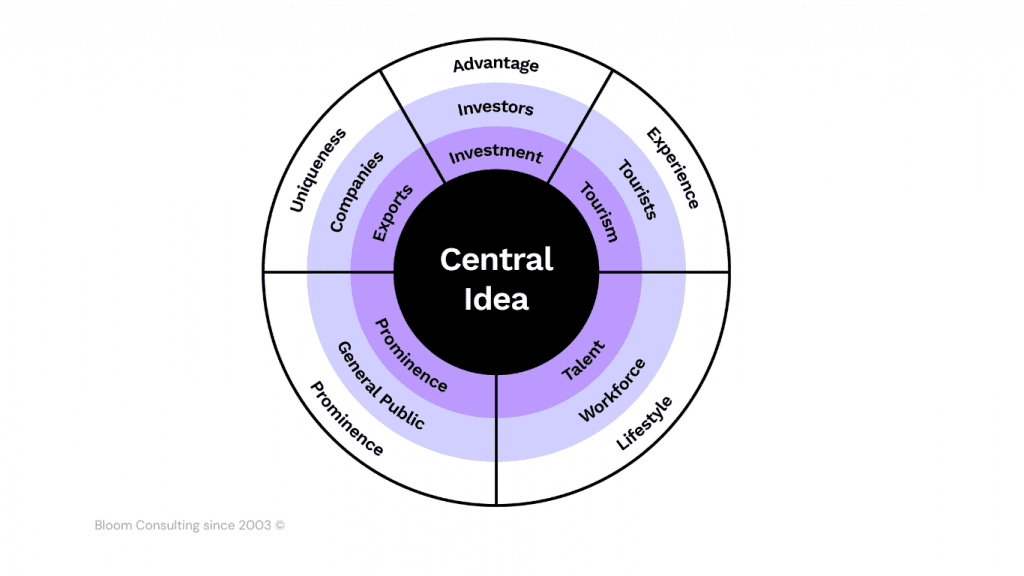In this article Bloom Consulting examines the differences and similarities between soft power and Nation Branding.
In an age when countries measure success in terms of economic and social wellbeing more than military might, soft power and Nation Branding have emerged as key tools for competition. But what sets these concepts apart? Do both relate to the culture and ideology of a nation? Is one more deliberate than the other? Let’s explore the differences and interconnections between the two.
Soft power – influence through culture, politics and diplomacy
Soft power is an intangible form of influence, shaping the attitudes and preferences of other countries and actors towards a nation. Using persuasion rather than coercion, it can result in behavioural change. Importantly, soft power, in contrast to hard power, such as military action, is never about force. It is not about pushing another country to exercise change, but rather inspiring said country to create its own change.
In the 21st century, global sentiment favours soft power over hard power.
Soft power’s main means of expression are culture (understood broadly as the values and practices of a society), foreign policy and political values. It is not established through the deliberate strategic attempts and actions of a government and public sector, but rather gained as a result of the country’s and its society’s actions, policies and values.
For soft power to achieve influence, it must offer something of benefit to the other party.
Examples of soft power include the social welfare systems of Nordic countries like Finland, the gastronomy of France, the British Royal Family, Hollywood movies and American TV shows.
Due to the unpredictable nature of soft power, it is not typically coordinated, however, it can be identified and embraced by governmental players and used to strengthen the effectiveness of a nation’s branding. The Japan Foundation, for example, was founded in 1972 to foster cultural ties and friendship between Japan and the world through cultural exchange programmes.
The contemporary understanding of soft power is strongly influenced by the political scientist Joseph Nye who popularised the concept in the 1980s.
Nation Branding – proactive strategic effort to drive economic development
Nation Branding is a deliberate attempt to build and curate positive perceptions of a country. It is a purposeful and strategic set of actions designed to communicate a country’s values, resources and features, including its soft power assets.
As an intentional process, Nation Branding relies on activities such as public and cultural diplomacy initiatives, media relations and managing a Digital Identity or online reputation. It can certainly benefit from strong soft power.
At the heart of a Nation Brand – the result of Nation Branding efforts – is its Central Idea: the positive feeling or emotion that places want people to experience when coming into contact with the place in some form. This is informed by the same intangible values that feed a country’s soft power. Indeed, a Nation Brand may be (but is not exclusively) “born” once a country’s soft power and its potential have been recognised and acknowledged.

For the Nation Brand to succeed, it is vital for all stakeholders to align their actions with the Central Idea and be empowered to carry it forth into the world.
For examples of successful Nation Branding strategies, refer to Costa Rica, Estonia and Finland.
So, like soft power, a Nation Brand is the consequence of certain actions; however, in the case of the latter, the actions are driven by proactive intent.
Soft power and Nation Branding – a powerful tandem
Both soft power and Nation Branding are vehicles for countries to gain influence on the world stage. Neither is an artificial construct, but a Nation Brand is typically cultivated, while soft power arises organically. The desirable result of both is positive perceptions of a country, which can lead to sustainable economic development through export growth and the attraction of investors, tourists and talent.
A nation can strengthen its soft power by enhancing its Nation Branding efforts, and the effectiveness of a Nation Brand can be boosted with the aid of strong soft power. In fact, Nation Branding can be a guiding framework for the country’s wider international relations. Together, the two are a powerful team that can increase the visibility and awareness of a country in today’s global sea of competition, fostering its development and reinforcing its identity.
To ensure that both the Nation Brand and soft power are performing to the best of their abilities calls for expert management. The goals of a brand management structure must include stakeholder buy-in across multiple sectors, political independence, long-term consistency in values and actions, and implementing a functional brand success measurement system. Today, this involves working across the “real” and virtual worlds, always keeping a finger on the pulse of a country’s Digital Identity or the Nation Brand in the digital environment.
While the management of a Nation Brand and, potentially, soft power, will depend on an apolitical structure, ultimately, the decision to invest in such efforts is political. When making such a decision, it is vital to remember that neither Nation Branding or soft power are short-term “projects” with an end date.
Published on 25.07.2024.











